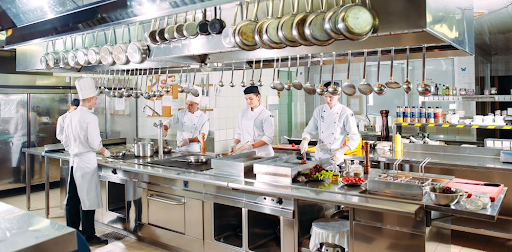A broken oven during dinner rush can cost you thousands in lost revenue and emergency repairs. Most restaurant owners wait until equipment fails before taking action. This reactive approach leads to expensive breakdowns, wasted food, and frustrated customers.
The truth is that regular maintenance prevents most kitchen disasters and extends the life of your equipment by years. A few minutes of daily checks and scheduled servicing can save you from scrambling to find a repair technician when your freezer stops working on a Friday night.
So, are you ready to trade those costly headaches for smooth operations? Here’s your essential guide to effortless kitchen equipment maintenance:
Schedule Professional Servicing
One way to ensure your commercial kitchen equipment is in top-notch condition is through professional servicing. Having professionals inspect your appliances regularly can prevent minor issues from turning into major repairs. They can test gas connections, inspect electrical systems, and calibrate cooking temperatures.
Scheduling planned maintenance once or twice a year may also keep your kitchen compliant with food safety standards. Just make sure you find the right person for the job. Look for a professional with experience with restaurant appliance repair and a solid understanding of commercial kitchen systems. A certified technician can spot wear and tear before it becomes a safety risk, giving you time to plan repairs without disrupting daily operations.
Create a Maintenance Routine
A steady routine keeps kitchen maintenance simple and effective. Instead of waiting for issues to appear, organize tasks into daily, weekly, and monthly checklists. Daily duties could include wiping surfaces, cleaning filters, and inspecting cooking equipment for leaks or wear.
Weekly inspections may involve tightening loose parts or checking door seals, while monthly deep cleans can target vents, coils, and other hidden areas. With a clear maintenance schedule, your team can stay organized and reduce the risk of missed or repeated tasks.
Clean Equipment Properly
In addition to appearance, keeping your kitchen equipment clean is also about maintaining safety and performance. Grease, food residue, and dust can build up quickly, affecting how appliances function and increasing the risk of fire hazards. That’s why following a clear cleaning schedule is so important.
Different tools need unique care. Commercial ovens and deep fryers may require daily cleaning, while exhaust hoods could benefit from professional attention every few months. Using the right cleaning products and following the manufacturer’s instructions can protect your restaurant equipment and keep your commercial kitchen safe, hygienic, and efficient.
Pay Attention to Manufacturer Guidelines
Every appliance in your commercial kitchen has a user manual outlining how to use and maintain it correctly. These instructions can guide you on cleaning methods, proper operation, and recommended service intervals. Skipping them could reduce the lifespan of your kitchen equipment or even void the warranty.
Keep these manuals in an easy-to-access spot so your team can review them when needed. Following the manufacturer’s guidance can improve reliability, reduce mistakes during maintenance, and support safer day-to-day operation.
Train Your Team
Even the best maintenance plan won’t work unless everyone understands their role. Holding short training sessions can show your restaurant staff how to clean equipment correctly, spot potential issues, and report them right away. Teaching simple habits, such as turning off appliances before cleaning or letting fryers cool before draining oil, can make a big difference in preventing accidents.
Encouraging teamwork keeps your commercial kitchen organized and reduces confusion during busy hours. When everyone takes responsibility for kitchen maintenance, your equipment can run more reliably, and the workspace can stay safer.
Store Equipment Correctly
Storing your equipment correctly can prevent unnecessary damage and make future use easier. Before putting anything away, clean and dry every surface to avoid rust or mold. Covering appliances keeps out dust, while unplugging them can lower electrical risks.
For portable or seasonal items, choose a cool, dry place away from grease or moisture on the kitchen floor. Good storage practices protect your cooking equipment and make setup quicker when it’s time to bring everything back into service.
Use Quality Replacement Parts
Choosing cheap replacement parts might seem like a quick fix, but it can create bigger issues down the line. Poor-quality components can wear out faster or even damage other areas of your commercial kitchen equipment. Sticking to genuine or approved parts can improve reliability and help your appliances last longer.
Maintaining a clear replacement schedule for key items such as filters, belts, and gaskets can make upkeep easier. This planning reduces the risk of sudden failures and supports smooth kitchen operations. Using trusted parts can make a real difference in protecting your investment and keeping your kitchen equipment in top condition.

Manage Energy Efficiency
Keeping your appliances in good condition can make them run more efficiently and use less energy. When filters are dirty, vents or furnaces are blocked, and seals are worn, machines have to work harder, which can increase utility costs. Regular inspections can keep your restaurant equipment performing well without major upgrades.
Paying attention to small details can also make a big impact. Cleaning coils, adjusting thermostat settings, and fixing minor leaks can reduce strain on your systems. Consistent commercial kitchen maintenance supports smoother operations and creates a more sustainable and cost-effective workspace.
Conclusion
Consistent care for your commercial kitchen equipment is the key to running your business smoothly and safely. A simple blend of regular cleaning, professional servicing, and a practical routine can make a real difference in preventing costly breakdowns.
When your team stays attentive and follows a steady schedule, you ensure your equipment can perform reliably for years. With these simple habits and the right plan, your kitchen stays efficient, prepared, and ready for every rush.





Be First to Comment